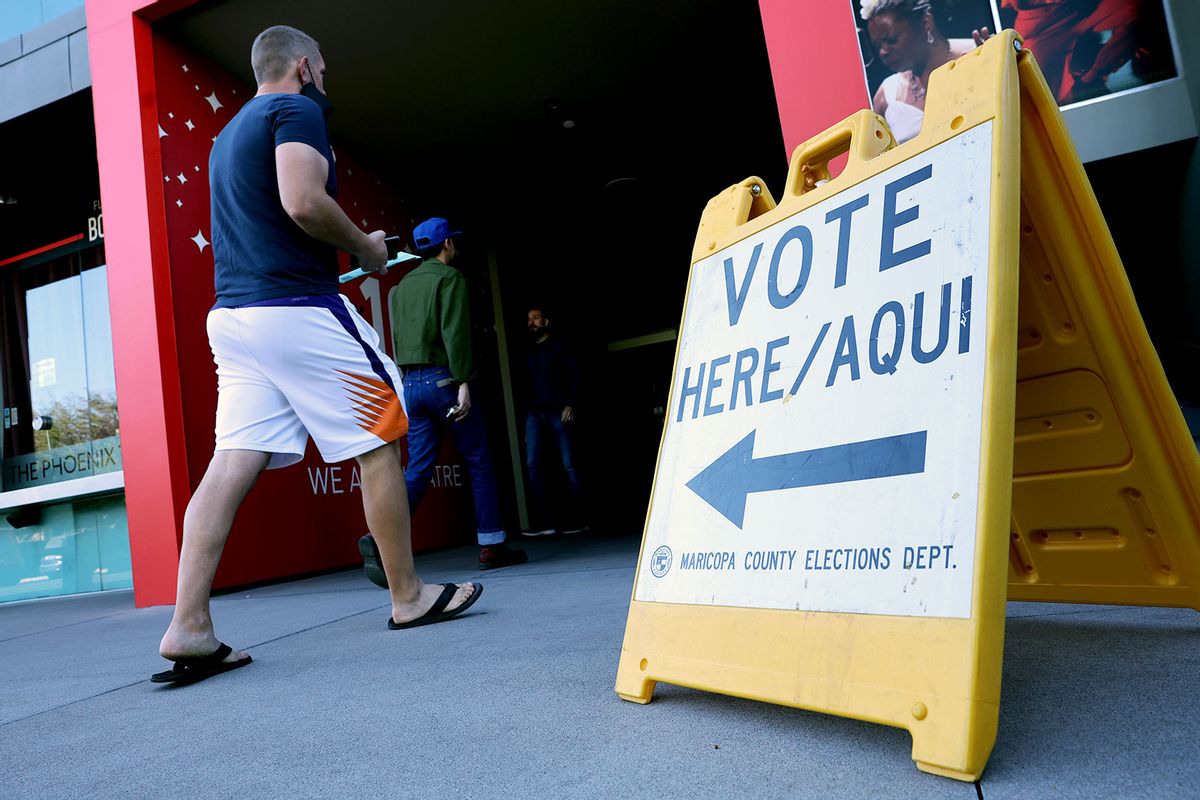A coalition of advocacy organizations sued the Trump administration Monday over President Donald Trump's executive order requiring Americans to present proof of citizenship to register to vote. Such a requirement — beyond exceeding the president's authority over state-run elections — would effectively silence the voice of college students registering for the first time, unsheltered voters and Native voters, argued the Arizona Students' Association, one of the parties to the lawsuit.
"We really saw firsthand what it looks like in Arizona if we do have these onerous citizenship requirements, so we really wanted to be a part of the voice fighting back to make sure that doesn't happen across the country," Kyle Nitschke, the organization's co-executive director, told Salon, referring to a now-blocked state law that also requires proof of citizenship. In a statement accompanying the lawsuit, he described Trump's order as a "clear attack on our voting rights," arguing that a federal proof of citizenship requirement would further disenfranchise college students.
The lawsuit, whose plaintiffs also include the League of United Latin American Citizens and military voter rights group Secure Families Initiative, is one of several legal challenges to arise from the order since Trump authorized it last Tuesday. It also comes amid the bevy of active litigation spawned from the Trump administration's crackdowns on immigration, targeting of diversity, equity and inclusion at the federal level and efforts to slash federal funds from public services.
Ostensibly seeking to address unfounded claims of widespread voter fraud via noncitizen voting, President Donald Trump's executive order purports to require eligible voters to present a U.S. passport, an ID compliant with the 2005 REAL ID Act, an official military ID card that indicates citizenship, or a valid federal or state ID that indicates citizenship to successfully register. Among other provisions, the order also prohibits the 18 states that accept absentee or mail-in ballots received after Election Day when they're postmarked on or before Election Day from counting those ballots.
In their complaint, the plaintiffs argue that Trump lacks the constitutional authority to make sweeping changes to federal voting laws and election rules or to require states to toss out valid absentee and mail-in ballots. They ask the court to declare that the parts of the president's order they flagged violate the U.S. Constitution, prevent them from taking effect and block the administration from taking actions to enforce the provisions.
"Through the Order, the President attempts to exercise powers that the Constitution withholds from him and instead assigns to the states and to Congress," lawyers from State Democracy Defenders and the Campaign Legal Center, who filed the suit on behalf of the plaintiffs, wrote in the complaint. "The Order violates and subverts the separation of powers by lawlessly arrogating to the President authority to declare election rules by executive fiat."
Nitschke said that the Arizona Students' Association decided to join the lawsuit after seeing the impact of a state proof-of-citizenship law on the out-of-state college students it serves. During the 2024 voter registration period, the organization mobilized to register around 3,000 students, half of whom could only register to vote in federal elections under the Arizona law using the federal form because they lacked proof of citizenship or residency.
If a federal requirement had been in place, those 1,500 out-of-state college students would not have been able to register to vote at all, Nitschke said.
We need your help to stay independent
A December Votebeat analysis of registered voter data in Arizona found that, while most of the state's 1,700 precincts have a dozen or fewer federal-only voters, the highest densities of federal-only voters were located around Arizona's college campuses. The analysis also found that more than 7% of those active federal-only voters live in precincts on or close to Native reservations — compared to the just 2.5% of registered voters who live on tribal land in the state — and that the precinct that's home to the state's main homeless shelter, which has mailboxes unsheltered people can use as a mailing address, had more than 265 federal-only voters.
"They say they want to make sure that noncitizens are not voting, but really this impacts college students, people moving frequently" and Native voters, Nitschke said.
Nitschke added that he hopes the lawsuit will resolve quickly so that Trump's executive order doesn't impede college voter registration ahead of the state's special election in September to fill the seat of former U.S. Rep. Raúl Grijalva, D, who died last month.
"It's coming up very quick here, a really important congressional election, and we have a lot of students who are going to be eligible to vote in that election, too," he said.
Read more
about voting rights



Shares